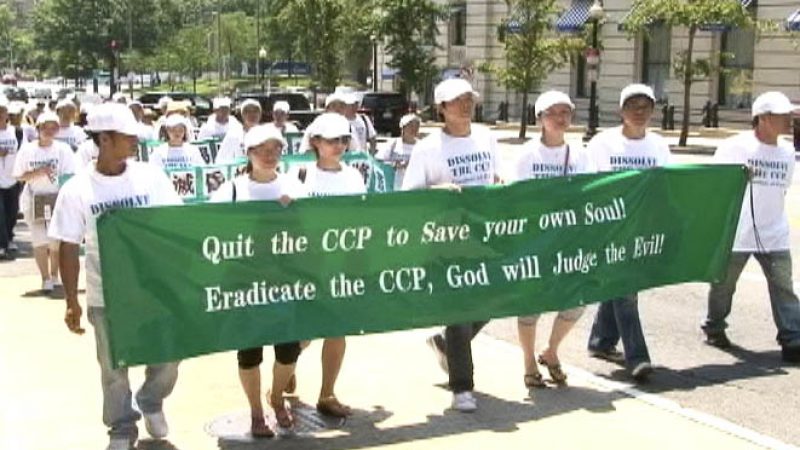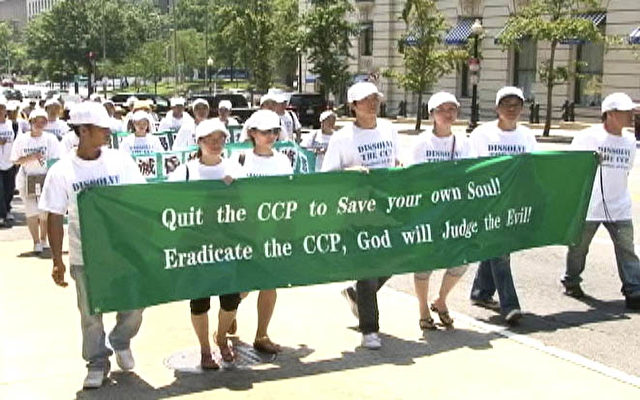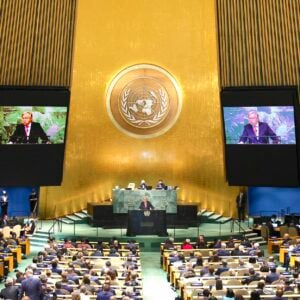
China’s Tuidang Movement Part 1: Why 100 Million People Are Leaving the CCP

ANCHOR:
A grassroots movement is challenging the rule of the Chinese Communist Party. It’s a movement that 100 million Chinese people have now participated in. Few people outside China have heard of it, but it may be playing a key role in determining China’s future. Today, we bring you Part 1 of a three-part series on what’s called the „Tuidang movement.“
STORY:
This year, the Chinese Communist Party marked its 90th anniversary. And the party has ruled China for nearly 62 years. But a grassroots movement is sweeping the country – and challenging the status quo.
It has millions of participants. But for many reasons, this movement has gone largely unnoticed by the rest of the world.
[Yi Rong, Vice President, Global Quit CCP Service Center]:
„It could be said that this is the biggest movement of spiritual awakening happening for the Chinese people in history.“
Scenes like this are seen around the globe – except in mainland China.
Organizers call it the „Tuidang Movement.“ „Tuidang“ means to withdraw or „quit“ the Party. It’s made up of people from mainland China and overseas Chinese who are publicly renouncing their ties with the Chinese Communist Party, or CCP.
It started in November 2004. That’s when the Chinese edition of the independent newspaper The Epoch Times published an editorial series called „Nine Commentaries on the Communist Party.“ It presents a rare in-depth analysis of the CCP.
[John Nania, Editor-in-Chief, The Epoch Times]:
„No one else has attempted or succeeded in fully exposing what the Communist Party has done over its decades of existence, in its 60-plus years of rule over China.“
The Nine Commentaries analyzes – and criticizes – the CCP in a way that’s difficult to do in China, because of the political climate. It gives dozens of examples of how the CCP’s ideology of violence and struggle has led to millions of deaths, and caused great suffering. Its words have resonated with many readers, showing them that their suffering under the CCP is shared.
The Nine Commentaries also argues that China will never be free and prosperous until the CCP is gone.
Less than two weeks after publishing the Nine Commentaries, the paper’s editors started getting statements from Chinese readers. Statements saying that they wanted to renounce their ties with the CCP.
A few months later, the Global Service Center for Quitting the Chinese Communist Party was formed. Its purpose was to collect these statements and help people withdraw from the CCP.
By April 2005, the Center had received more than a million statements of withdrawal. Today, they say that number has grown to more than 100 million.
Mostly, these statements come from people declaring their withdrawal from one of the three CCP organizations: The Young Pioneers, the Communist Youth League, and the Communist Party itself. This is why the movement is also known by another name – Santui, or the „three withdrawals.“
While many of those who withdraw are not current members, this does not exclude them from the Tuidang movement. In fact, the rules for withdrawing are so simple that it’s hard to call Tuidang a political movement at all: It doesn’t matter whether you’re an active member of the party, or if your membership has expired. You don’t have to give out your contact details. And you can even use a fake name if you’re afraid of retribution.
There’s only one thing that really matters:
[Yi Rong, Vice President, Global Quit CCP Service Center]:
„As long as people completely sever their ties with the CCP, from their heart and spiritually, and they are clear about this, I believe this is what is acknowledged.“
It’s a political movement where people’s hearts – not policy views – are what’s important.
[John Nania, Editor in Chief, The Epoch Times]:
„They have to wash their hands of the blood from the Communist Party. Because the oaths that they take, when they join the Communist Party or one of its organizations include a lot of vows about blood, and giving their blood for the party, and so forth. And of course a lot of blood has been spilled in the history of the Party, 80 million people have died from unnatural causes due to actions of the Communist Party during its history.“
The Tuidang movement is distinctly Chinese in its worldview – very different from the Western-style democracy movement of the 1980s or the more recent Charter 08.
The Tuidang movement doesn’t even discuss policy. It emphasizes morality, and has roots in China’s ancient Buddhist and Taoist culture. The Nine Commentaries calls for renewing morality – in a culture that it says has been corrupted by the violent ideology of the Communist Party.
That’s why people’s statements of withdrawal tend to reflect their views on morality rather than politics.
For example, this one, from a man named Ma Hua. Ma’s father and grandfather were both members of the CCP. Ma himself was also a member, and he worked as a public servant for ten years.
He writes: „I personally understand and experienced the lies, deceit, mental control and brutality of the CCP that the Nine Commentaries on the Chinese Communist Party has exposed. But for my livelihood, I joined the CCP and have done stupid things against my own conscience. I now deeply regret this and hope that through this format of Tuidang, I can make up for my wrongdoings, and my conscience can rest a little better.“
[Leung Yiu-chung, Hong Kong Legislative Council Member]:
„With people willing to leave this Party, and leave their vested interests, it in fact reflects their awakening to the state of corruption in China. They no longer want to support this dishonest, unhealthy state of affairs. It actually reflects the continual awakening of the Chinese people.“
[Qu Zheng, Columnist for The Epoch Times]:
„The Tuidang wave started by the Nine Commentaries actually fundamentally changes people’s hearts. It lets people truly realize that they want to sever themselves from what is wicked, and stop being indifferent.“
It’s a renewal that has its roots in China’s traditional culture, not in politics. And it’s being pushed forward in an unlikely way – not by intellectuals or foreign governments, but by a loose affiliation of volunteers.
And it could very well change the future of China.
(Reporting by Karen Chang, Shelley Zhang, and Matt Gnaizda. Video editing by Lia Onely.)
——————
Disclosure Note:
NTD has an affiliation with The Epoch Times, publisher of the Nine Commentaries editorial series that is regarded as the catalyst of the Tuidang movement. In 2005, NTD created a video version of the Nine Commentaries and broadcast it via satellite into China, as well as in other places around the globe. This may have had an impact on the Tuidang movement’s spread. Watch the Nine Commentaries in English.
 Foto: NTD
Foto: NTD



























vielen Dank, dass Sie unseren Kommentar-Bereich nutzen.
Bitte verzichten Sie auf Unterstellungen, Schimpfworte, aggressive Formulierungen und Werbe-Links. Solche Kommentare werden wir nicht veröffentlichen. Dies umfasst ebenso abschweifende Kommentare, die keinen konkreten Bezug zum jeweiligen Artikel haben. Viele Kommentare waren bisher schon anregend und auf die Themen bezogen. Wir bitten Sie um eine Qualität, die den Artikeln entspricht, so haben wir alle etwas davon.
Da wir die Verantwortung für jeden veröffentlichten Kommentar tragen, geben wir Kommentare erst nach einer Prüfung frei. Je nach Aufkommen kann es deswegen zu zeitlichen Verzögerungen kommen.
Ihre Epoch Times - Redaktion